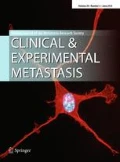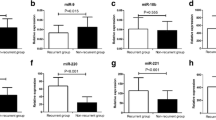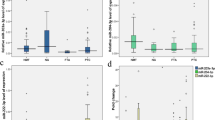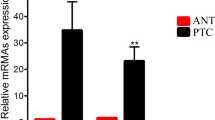Abstract
Despite low mortality rates, nodal recurrence in papillary thyroid carcinoma occurs in up to 20 % of patients. Emerging evidences indicate that dysregulated microRNAs are implicated in the process of metastasis. In the present study, we investigated whether miR-9, miR-10b, miR-21 and miR-146b levels are predictive of papillary thyroid carcinoma recurrence. Using macro-dissection followed by quantitative real-time PCR, we measured miR-9, miR-10b, miR-21 and miR-146b expression levels in formalin-fixed, paraffin-embedded samples of 66 patients with papillary thyroid carcinoma categorized into two groups: the recurrent group (n = 19) and the non-recurrent group (n = 47). All patients underwent total thyroidectomy and were followed for at least 120 months after surgery to be considered recurrence-free. Univariate and multivariate analysis were performed using the Cox proportional hazard model in order to identify associations between multiple clinical variables and microRNA expression levels and papillary thyroid carcinoma recurrence. MiR-9 and miR-21 expression levels were found to be significant prognostic factors for recurrence in patients with papillary thyroid carcinoma (HR = 1.48; 95 % CI 1.24–1.77, p < 0.001; and HR = 1.52; 95 % CI 1.18–1.94, p = 0.001; respectively). Multivariate analysis involving the expression level of miR-9 and miR-21 and various clinical parameters identified the expression of these microRNAs as independent prognostic factors for papillary thyroid cancer patients. In conclusion, our results support the potential clinical value of miR-9 and miR-21 as prognostic biomarkers for recurrence in papillary thyroid carcinoma.

Similar content being viewed by others
Abbreviations
- PTC:
-
Papillary thyroid carcinoma
- miR:
-
microRNA
- PCR:
-
Polymerase chain reaction
- qRT-PCR:
-
Quantitative real time polymerase chain reaction
- RNA:
-
Ribonucleic acid
- IBCC:
-
Instituto Brasileiro de Controle do Câncer
- UICC:
-
Union for International Cancer Control
- TNM:
-
Tumor, nodes, metastasis
- ATA:
-
American Thyroid Association
- MSKCC–NY:
-
Memorial Sloan Kettering Cancer Center–New York
- FFPE:
-
Formalin-fixed paraffin-embedded
- cDNA:
-
Complementary deoxyribonucleic acid
- HR:
-
Hazard ratio
- CI:
-
Confidence interval
- cm:
-
Centimeter
- EGFR:
-
Epidermal growth factor receptor
- MMP16:
-
Matrix metalloproteinase 16
- ICAM1:
-
Intercellular adhesion molecule 1
- STMN1:
-
Stathmin 1
References
Ferlay J, Soerjomataram I, Ervik M, et al (2013) GLOBOCAN 2012 v1.0, Cancer Incidence and Mortality Worldwide: IARC CancerBase No. 11 [Internet]. Lyon, France: International Agency for Research on Cance. http://globocan.iarc.fr. Accessed 04 Dec 2014
Hundahl SA, Fleming ID, Fremgen AM, Menck HR (1998) A National Cancer Data Base report on 53,856 cases of thyroid carcinoma treated in the U.S., 1985–1995. Cancer 83:2638–2648
Mazzaferri EL, Jhiang S (1994) Long term impact of initial surgical and medical therapy on papillary and follicular thyroid cancer. Am J Med 97:418–428
Gilliand FD, Hunt WC, Morris DM, Key CR (1997) Prognostic factors for thyroid carcinoma. A population-based study of 151,698 cases from surveillance, epidemiology and end results (SEER) program 1973–1991. Cancer 79:564–573
Cooper DS, Doherty GM, Haugen BR et al (2006) American Thyroid Association Guidelines Taskforce. Management guidelines for patients with thyroid nodules and differentiated thyroid cancer. Thyroid 16:109–142
Scheumann GF, Gimm O, Wegener G, Hundeshagen H, Dralle H (1994) Prognostic significance and surgical management of locoregional lymph node metastases in papillary thyroid cancer. World J Surg 18:559–567
Mazzaferri EL, Kloos RT (2001) Clinical review 128: current approaches to primary therapy for papillary and follicular thyroid cancer. J Clin Endocrinol Metab 86:1447–1463
Hay ID, Thompson GB, Grant CS et al (2002) Papillary thyroid carcinoma managed at the Mayo Clinic during six decades (1940–1999): temporal trends in initial therapy and long-term outcome in 2444 consecutively treated patients. World J Surg 26:879–885
Pellegriti G, Scollo C, Lumera G, Regalbuto C, Vigneri R, Belfiore A (2004) Clinical behaviour and outcome of papillary thyroid cancers smaller than 1,5 cm in diameter: study of 299 cases. J Clin Endocr Metabol 89:3713–3720
Grant CS (2015) Recurrence of papillary thyroid cancer after optimized surgery. Gland Surg 4(1):52–56
Sobin LH, Wittekind C (2009) UICC: TNM classification of malignant tumors, 7th edn. Wiley-Liss, New York
Cady B, Rossi R (1998) An expanded view of risk group definition in differentiated thyroid carcinoma. Surgery 104:947–953
Hay ID, Grant CS, Taylor WF, MaConahey WM (1987) Ipsilateral lobectomy versus bilateral lobar resection in papillary thyroid carcinoma: a retrospective analysis of survival outcome using a novel prognostic scoring system. Surgery 102:1088–1095
Hay ID, Bergstrahl EJ, Goellner JR, Ebersold JR, Grant CS (1993) Predicting outcome in papillary thyroid carcinoma: development of a reliable prognostic scoring system in a cohort of 1779 patients surgically treated at one institution during 1940 through 1989. Surgery 114:1050–1058
Revised American Thyroid Association Management Guidelines For Patients With Thyroid Nodules And Differentiated Thyroid Cancer (2009) The American Thyroid Association (ATA) guidelines taskforce on thyroid nodules and differentiated thyroid cancer. Thyroid 19(11):1167–1214
Shaha AR, Shah JP, Loree TR (1998) Patterns of failure in differentiated carcinoma of the thyroid based on risk groups. Head Neck 20:26–30
Byar DP, Green SB, Dor P et al (1979) A prognostic index for thyroid carcinoma. A study of the E.O.R.T.C. Thyroid Cancer Cooperative Group. Eur J Cancer 15:1033–1041
Calin GA, Dumitru CD, Shimizu M et al (2002) Frequent deletions and down-regulation of micro-RNA genes miR15 and miR16 at 13q14 in chronic lymphocytic leukemia. Proc Natl Acad Sci USA 99:15524–15529
Ma L, Teruya-Feldstein J, Weinberg RA (2007) Tumour invasion and metastasis initiated by microRNA-10b in breast cancer. Nature 449:682–688
He H, Jazdzewski K, Li W et al (2005) The role of microRNA genes in papillary thyroid carcinoma. Proc Natl Acad Sci USA 102:19075–19080
Pallante P, Visone R, Ferracin M et al (2006) MicroRNA deregulation in human thyroid papillary carcinomas. Endocr Relat Cancer 13(2):497–508
Tetzlaff MT, Liu A, Xu X et al (2007) Differential expression of miRNAs in papillary thyroid carcinoma compared to multinodular goiter using formalin fixed paraffin embedded tissues. Endocr Pathol 18(3):163–173
Nikiforova MN, Tseng GC, Steward D et al (2008) MicroRNA expression profiling of thyroid tumors: biological significance and diagnostic utility. J Clin Endocrinol Metab 93:1600–1608
Chou CK, Chen RF, Chou FF et al (2010) MiR-146b is highly expressed in adult papillary thyroid carcinomas with high risk features including extrathyroidal invasion and the BRAF mutation. Thyroid 20(5):489–494
Lee JC, Zhao JT, Clifton-Bligh RJ et al (2013) MicroRNA-222 and microRNA-146b are tissue and circulating biomarkers of recurrent papillary thyroid cancer. Cancer 119:4358–4365
Yip L, Kelly L, Shuai Y et al (2011) MicroRNA signature distinguishes the degree of aggressiveness of papillary thyroid carcinoma. Ann Surg Oncol 18:2035–2041
Chou CK, Yang KD, Chou FF et al (2013) Prognostic implications of miR-146b expression and its functional role in papillary thyroid carcinoma. JCEM 98(2):E196–E205
Sun XJ, Liu H, Zhang P, Zhang ZD, Jiang ZW, Jiang CC (2013) miR-10b promotes migration and invasion in nasopharyngeal carcinoma cells. Asian Pac J Cancer Prev 14(9):5533–5537
Ouyang H, Gore J, Deitz S, Korc M (2013) microRNA-10b enhances pancreatic cancer cell invasion by suppressing TIP30 expression and promoting EGF and TGF-b actions. Oncogene 1–11
Li Z, Gu X, Fang Y, Xiang J, Chen Z (2012) microRNA expression profiles in human colorectal cancers with brain metastases. Oncol Lett 3(2):346–350
Yang Z, Miao R, Li G et al (2013) Identification of recurrence related microRNAs in hepatocellular carcinoma after surgical resection. Int J Mol Sci 14:1105–1118
Huang Y-H, Lin K-H, Chen H-C et al (2012) Identification of postoperative prognostic MicroRNA predictors in hepatocellular carcinoma. PLoS One 7(5):e37188
Han Z, Chen HY, Fan JW, Wu JY, Tang HM, Peng ZH (2012) Up-regulation of microRNA-155 promotes cancer cell invasion and predicts poor survival of hepatocellular carcinoma following liver transplantation. J Cancer Res Clin Oncol 138:153–161
Han Z, Zhonga L, Tengb M-J et al (2012) Identification of recurrence-related microRNAs in hepatocellular carcinoma following liver transplantation. Mol Oncol 6:445–447
Jikuzono T, Kawamoto M, Yoshitake H et al (2013) The miR-221/222 cluster, miR-10b and miR-92a are highly up-regulated in metastatic minimally invasive follicular thyroid carcinoma. Int J Oncol 42:1858–1868
Xu T, Liu X, Han L, Shen H, Liu L, Shu Y (2013) Up-regulation of mir-9 expression as a poor prognostic biomarker in patients with non-small cell lung cancer. Clin Transl Oncol. doi:10.1007/s12094-013-1106-1
Sun Z, Han Q, Zhou N et al (2013) MicroRNA-9 enhances migration and invasion through KLF17 in hepatocellular carcinoma. Mol Oncol 7:884–894
Ma L, Young J, Prabhala H et al (2010) Mir-9, a MYC/MYCN-activated microRNA, regulates E-cadherin and cancer metastasis. Nat Cell Biol 12(3):247–256
Wang J, Zhao H, Tang D et al (2013) Overexpressions of microRNA-9 and microRNA-200c in human breast cancers are associated with lymph node metastasis. Cancer Biother Radiopharma 28(4):283–288
Zhu L, Chen H, Zhou D et al (2012) MicroRNA-9 up-regulation is involved in colorectal cancer metastasis via promoting cell motility. Med Oncol 29:1037–1043
Hildebrandt MAT, Gu J, Lin J et al (2010) Hsa-miR-9 methylation status is associated with cancer development and metastatic recurrence in patients with clear cell renal cell carcinoma. Oncogene 29:5724–5728
Zheng L, Qi T, Yang D et al (2013) microRNA-9 suppresses the proliferation, invasion and metastasis of gastric cancer cells through targeting cyclin D1 and Ets1. PLoS One 8(1):e55719
Laios A, O’Toole S, Flavin R et al (2008) Potential role of miR-9 and miR-223 in recurrent ovarian cancer. Mol Cancer 28(7):35
Kjaer-Frifeldt S, Hansen TF, Nielsen BS, Joergensen S, Lindebjerg J, Soerensen FB (2012) The prognostic importance of mir-21 in stage II colon cancer: a population-based study. Br J Cancer 107:1169–1174
Oue N, Anami K, Schetter AJ et al (2014) High mir-21 expression from FFPE tissues is associated with poor survival and response to adjuvant chemotherapy in colon cancer. Int J Cancer 134:1926–1934
Weissmann-Brenner A, Kushnir M, Yanai GL et al (2012) Tumor microRNA-29a expression and the risk of recurrence in stage II colon cancer. Int J Oncol 40(6):2097–2103
Zaravinos A, Radojicic J, Lambrou GI et al (2012) Expression of MiRNAs involved in angiogenesis, tumor cell proliferation, tumor suppressor inhibition, epithelial-mesenchymal transition and activation of metastasis in bladder cancer. J Urol 188:615–623
Yang M, Shen H, Qiu C et al (2013) High expression of mir-21 and mir-155 predicts recurrence and unfavorable survival in non-small cell lung cancer. Eur J Cancer 49:604–615
Ota D, Mimori K, Yokobori T et al (2011) Identification of recurrence-related microRNAs in the bone marrow of breast cancer patients. Int J Oncol 38:955–962
Wang G, Wang L, Sun S et al (2015) Quantitative measurement of serum microRNA-21 expression in relation to breast cancer metastasis in Chinese female. Ann Lab Med 35(2):226–232
Li T, Li RS, Li YH et al (2012) miR-21 as an independent biochemical recurrence predictor and potential therapeutic target for prostate cancer. J Urol 187:1466–1472
Hummel R, Hussey DJ, Michael MZ et al (2011) MiRNAs and their association with locoregional staging and survival following surgery for esophageal carcinoma. Ann Surg Oncol 18:253–260
Akagi I, Miyashita M, Ishibashi O et al (2011) Relationship between altered expression levels of MIR21, MIR143, MIR145, and MIR205 and clinicopathologic features of esophageal squamous cell carcinoma. Dis Esophagus 24:523–530
Li P, Mao WM, Zheng ZG et al (2013) Down-regulation of PTEN expression modulated by dysregulated miR-21 contributes to the progression of esophageal cancer. Dig Dis Sci 58(12):3483–3493
Ren Q, Liang J, Wei J et al (2014) Epithelial and stromal expression of miRNAs during prostate cancer progression. Am J Transl Res 6(4):329–339
Livak KJ, Schmittgen TD (2001) Analysis of relative gene expression data using real-time quantitative PCR and the 2-DDCT method. Methods 25:402–408
Costa S, Giugliano G, Santoro L et al (2009) Role of prophylactic central neck dissection in cN0 papillary thyroid cancer. Acta Otorhinolaryngol Ital 29:61–69
Wada N, Duh QY, Sugino K et al (2003) Lymph node metastasis from 259 papillary thyroid microcarcinomas. Ann Surg 237(3):399–407
Wang Q, Chu B, Zhu J et al (2014) Clinical analysis of prophylactic central neck dissection for papillary thyroid carcinoma. Clin Transl Oncol 16:44–48
Lee YS, Kim SW, Kim SK, Kang HS, Lee ES, Chung KW (2007) Extent of routine central lymph node dissection with small papillary thyroid carcinoma. World J Surg 31:1954–1959
Shaha AR, Loree TR, Shah JP (1994) Intermediate risk group for differentiated carcinoma of the Thyroid. Surgery 116:1036–1042
Ito Y, Tomoda C, Uruno T et al (2006) Clinical significance of metastasis to the central compartment from papillary microcarcinoma of the thyroid. World J Surg 30:91–99
Machens A, Holzhausen HJ, Dralle H (2005) The prognostic value of primary tumor size in papillary and follicular thyroid carcinoma. Cancer 103:2269–2273
Suh YJ, Kwon H, Kim SJ et al (2015) Factors affecting the locoregional recurrence of conventional papillary thyroid carcinoma after surgery: a retrospective analysis of 3381 patients. Ann Surg Oncol [Epub ahead of print]
Ito Y, Jikuzono T, Higashiyama T et al (2006) Clinical significance of lymph node metastasis of thyroid papillary carcinoma located in one lobe. World J Surg 30:1821–1828
Roh JL, Kim JM, Park CI (2011) Central lymph node metastasis of unilateral papillary thyroid carcinoma: patterns and factors predictive of nodal metastasis, mor- bidity, and recurrence. Ann Surg Oncol 18:2245–2250
Koo BS, Choi EC, Yoon YH, Kim DH, Kim EH, Lim YC (2009) Predictive factors for ipsilateral or contralateral central lymph node metastasis in unilateral papillary thyroid carcinoma. Ann Surg 249:840–844
Sato N, Oyamatsu M, Koyama Y, Emura I, Tamiya Y, Hatakeyama K (1998) Do the level of nodal disease according to the TNM classification and the number of involved cervical nodes reflect prognosis in patients with differentiated carcinoma of the thyroid gland? J Surg Oncol 69:151–155
Grebe SK, Hay ID (1996) Thyroid cancer nodal metastases: biological significance and therapeutic considerations. Surg Oncol Clin N Am 5:43–63
Wada N, Suganuma N, Nakayama H et al (2007) Microscopic regional lymph node status in papillary thyroid carcinoma with and without lymphadenopathy and its relation to outcomes. Langenbecks Arch Surg 392:417–422
Hughes CJ, Shaha AR, Shah JP, Loree TR (1996) Impact of lymph node metastasis in differentiated carcinoma of the thyroid: a matched-pair analysis. Head Neck 18:127–132
Lundgren CI, Hall P, Dickman PW, Zedenius J (2006) Clinically significant prognostic factors for differentiated thyroid carcinoma: a population-based, nested case-control study. Cancer 106:524–531
Beasley NJP, Lee J, Eski S, Walfish P, Witterick I, Freeman JL (2002) Impact of nodal metastases on prognosis in patients with well-differentiated thyroid cancer. Arch Otolaryngol Head Neck Surg 128:825–828
Bardet S, Malville E, Rame JP et al (2008) Macroscopic lymph-node involvement and neck dissection predict lymph-node recurrence in papillary thyroid carcinoma. Eur J Endocr 158:551–560
Edmonds MD, Hurst DR, Vaidya KS, Stafford LJ, Chen D, Welch DR (2009) Breast cancer metastasis suppressor 1 coordinately regulates metastasis-associated microRNA expression. Int J Cancer 125(8):1778–1785
Liu Y, Zhao J, Zhang PY et al (2012) MicroRNA-10b targets E-cadherin and modulates breast cancer metastasis. Med Sci Monit 18(8):BR299–BR308
Katakowski M, Zheng X, Jiang F, Rogers T, Szalad A, Chopp M (2010) MiR-146b-5p suppresses EGFR expression and reduces in vitro migration and invasion of glioma. Cancer Invest 28(10):1024–1030
Hurst DR, Edmonds MD, Scott GK, Benz CC, Vaidya KS, Welch DR (2009) Breast cancer metastasis suppressor 1 up-regulates miR-146, which suppresses breast cancer metastasis. Cancer Res 69(4):1279–1283
Li Y, Wang Y, Yu L et al (2013) MiR-146b-5p inhibits glioma migration and invasion by targeting MMP16. Cancer Lett 339:260–269
Wang Z, Zhang H, He L et al (2013) Association between the expression of four up-regulated miRNAs and extrathyroidal invasion in papillary thyroid carcinoma. Oncotargets Ther 6:281–287
Terao M, Fratelli M, Kurosaki M et al (2011) Induction of miR-21 by retinoic acid in estrogen receptor-positive breast carcinoma cells: biological correlates and molecular targets. J Biol Chem. 286(5):4027–4042
Buitrago D, Keutgen XM, Crowley M et al (2012) Intercellular adhesion molecule-1 (ICAM-1) is upregulated in aggressive papillary thyroid carcinoma. Ann Surg Oncol 19(3):973–980
Tan W, Gu J, Huang M, Wu X, Hildebrandt MAT (2014) Epigenetic analysis of microRNA genes in tumors from surgically resected lung cancer patients and association with survival. Carcinog, Mol. doi:10.1002/mc.22149
Lujambio A, Calin GA, Villanueva A et al (2008) A microRNA DNA methylation signature for human cancer metastasis. Proc Natl Acad Sci 105:13556–13561
Khoo MLC, Beasley NJP, Ezzat S et al (2002) Overexpression of cyclin D1 and underexpression of p27 predict lymph node metastases in papillary thyroid carcinoma. J Clin Endocrinol Metab 87(4):1814–1818
Song Y, Mu L, Han X et al (2013) MicroRNA-9 inhibits vasculogenic mimicry of glioma cell lines by suppressing Stathmin expression. J Neurooncol 115(3):381–390
Gustavo Baldassarre G, Belletti B, Nicoloso MS et al (2005) p27Kip1-stathmin interaction influences sarcoma cell migration and invasion. Cancer Cell 7(1):51–63
Author information
Authors and Affiliations
Corresponding author
Electronic supplementary material
Below is the link to the electronic supplementary material.
Rights and permissions
About this article
Cite this article
Sondermann, A., Andreghetto, F.M., Moulatlet, A.C.B. et al. MiR-9 and miR-21 as prognostic biomarkers for recurrence in papillary thyroid cancer. Clin Exp Metastasis 32, 521–530 (2015). https://doi.org/10.1007/s10585-015-9724-3
Received:
Accepted:
Published:
Issue Date:
DOI: https://doi.org/10.1007/s10585-015-9724-3




